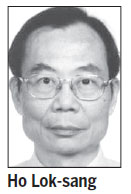Allocate more resources to education for disabled people
Updated: 2012-11-28 07:20
By Ho Lok-sang(HK Edition)
|
|||||||||

Among the various findings from the "Study on Equal Learning Opportunities for Students with Disabilities under the Integrated Education System", three in particular deserve our attention. The study was commissioned by the Equal Opportunities Commission and conducted from September 2010 to November 2011, Two of these findings deserving attention are:
1. Some 20 percent of principals, teachers, and professionals surveyed disagree with the need to make changes to physical facilities and/or pedagogical approach to address the needs of students with Special Education Needs (SEN). About 20 percent to 43 percent of teachers were reluctant to accept students with intellectual disabilities, attention deficit and hyperactivity disorders, and autistic spectrum disorders in regular classes.
2. Fifty-seven percent of principals, 62 percent of teachers and 55 percent of the education professionals disagree that excluding students with SEN from regular classes was a discriminatory practice.
These findings may appear strange and puzzling. But once we see the third finding, the results are no longer difficult to explain. Here is the third finding:
3. Sixty-one percent of principals, 43 percent of the teachers, 49 percent of the education professionals and 37 percent of parents of students with SEN believe the schools receive insufficient government subsidies/resources in terms of funding, teachers' training, manpower allocation and professional support to implement integrated education.
When 61 percent of the principals surveyed say that resources are inadequate, it must be so, because they are in the best position to judge. That the resources for the effective implementation of integrated education are inadequate is further supported by the unwillingness of principals, teachers and professionals to devote resources to serve the needs of students with SEN.
The report also noted that the number of principals and teachers with special education training in schools implementing integrated education policy is rather low. Only 26 percent of the principals had attended special education training courses. 49 percent of the teachers have not received any training in inclusive education. Only 1-2 percent of the principals and teachers possessed professional diploma or degree in special education. Inadequate training on the part of principals and teachers is just another aspect of inadequate resources to support integrated education.
There is also a wide range of difficulties among those with special needs. Some may be quite bright but they are handicapped by hearing/eyesight impairment. Others may be mentally handicapped. Still others may be autistic. It is not difficult to see that there are classes such that some students with SEN will not really benefit from attending. Simply having them in the class does not mean that we are thereby giving them education. Students with special needs should be given special sessions tailor-made to help them. In other words, integrated education should be compatible with special classes for the special students and integrated education classes covering only part of the school curriculum. Some "special students" should have more integrated classes and some should have less-depending on the nature and extent of their special needs.
Dr TSE Wing-ling, convenor of the Policy and Research Committee of the Equal Opportunities Commission, concluded that the study indicates that the present integrated education system is far from satisfactory and that the underlying problems are mainly inadequate resources, training and support. This is, however, more a problem of inadequate government policy than a problem of the stubborn attitudes of principals and teachers, as was suggested when Mr Tse said: "Integrated education policy has been in place for over ten years, but the attitudes of teachers had hardly made any progress." The fact is that teachers and principals face real resource constraints, but students with SEN need a lot of resources to help them.
Given the declining enrollment at schools, and teachers' concern over redundancy due to the closure of schools, the government is well advised to give teachers the opportunity to receive proper training in special education, and then to retain them as special education teachers. Education is about exploring and developing the potential of students. The Financial Secretary recently indicated in his blog that the government "has never spared any resources to fund on a recurrent basis new policies and programs that had attracted a consensus and that had matured through thorough discussions."
Integrated education is a program that was launched over ten years ago "to protect and promote the health of the population," on assumption that it was the right policy. Unfortunately it has never been properly funded. It is time to take up the funding issue seriously.
The author is director of the Centre for Public Policy Studies, Lingnan University.
(HK Edition 11/28/2012 page3)